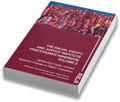
The upshot is that effective
racial-equity practices support the success of all students.”
Nearly four years ago, the Leading for Change Racial Equity and Justice Institute (REJI) published a handbook designed to guide institutions interested in moving forward efforts toward improving racial equity on their campuses.
Originally conceived as a “conversation starter,” in the words of Dr. Sabrina Gentlewarrior, vice president of Student Success, Equity and Diversity, The Leading for Change Racial Equity and Justice Institute Practitioner Handbook has done that and more. Now, it has been expanded and reissued (and downloadable free here), with one of its key areas receiving additional emphasis.
“This newest handbook focuses on equity-minded systemic change,” Dr. Gentlewarrior said.
“Equity mindedness” is a practice that is data-informed and institutionally focused, she added.
“So instead of blaming students who are experiencing disparate outcomes, equity-minded institutions take it as their responsibility to change themselves in order to better serve students,” Dr. Gentlewarrior said. “We begin by looking to find things in our policies, practices and pedagogies that are disadvantaging students of color.”
The Leading for Change Racial Equity and Justice Institute is composed of more than 40 New England campuses and a team from the state Department of Education. It has been housed at Bridgewater State University since its inception in 2014 and was convened by Dr. Gentlewarrior. The goal of REJI is to eradicate persistent systemic racism on campus with a commitment to “hopeful, research and data-driven strategies to create racially equitable change in higher education.”
The second edition of the handbook was edited by Yolany Gonell, assistant vice president of Student Success, Equity and Diversity; Dr. Uma Shama, a professor in the Department of Mathematics; and Dr. Luis F. Paredes, associate vice president for Institutional Equity and Belonging at Wheaton College in Norton. It represents a free-access, 350-page resource that shares strategies designed to transform higher education through racially equitable action. Featured in the handbook are equity-minded strategies focused on leadership, teaching and learning, as well as practices for centering racial equity campus-wide.
It has already earned praise from no less than the scholar who first coined the term “equity minded,” Dr. Estela Bensimon, founding director of the Center for Urban Education at the University of Southern California, who is also one of the contributors.
“This book provides the inspiration and ideas to help readers achieve” racial equity on their campuses, she said. “One of the most important contributions of The REJI Practitioner Handbook, Volume 2, is that by insisting on authors who are practitioners, readers benefit directly from their discussions about how they have incorporated equity mindedness into their practices and values. Their efforts demonstrate that institutional actors – leaders, faculty, staff, board members – have it within their power to take equity-minded action to eliminate racial inequality. This book provides the inspiration and ideas to help readers achieve it.”
The handbook features information for trustees, presidents, faculty and staff, written by practitioners and scholars from BSU and other institutions.
Contributors also include BSU President Frederick W. Clark Jr., who coauthored one of the handbook’s many articles and supported the project from the first.
“BSU is proud to play a leadership role in publishing this important handbook,” he said. “The student success that is central to our mission is predicated on providing a campus that makes equity a top priority. This second edition of the handbook speaks to the never-ending need to do better and to bring innovative approaches to ensure a level playing field for all.”
Equity mindedness has a positive impact on all students, no matter their ethnicities or backgrounds, Dr. Gentlewarrior said. And the work of REJI and the handbook have already paid dividends.
“We can serve them more effectively, and what we’re seeing at REJI campuses is that longstanding racialized institution performance gaps are beginning to close and be eliminated,” she said. “The upshot is that effective racial-equity practices support the success of all students.”
Download the free PDF handbook at https://reji-bsu.org
